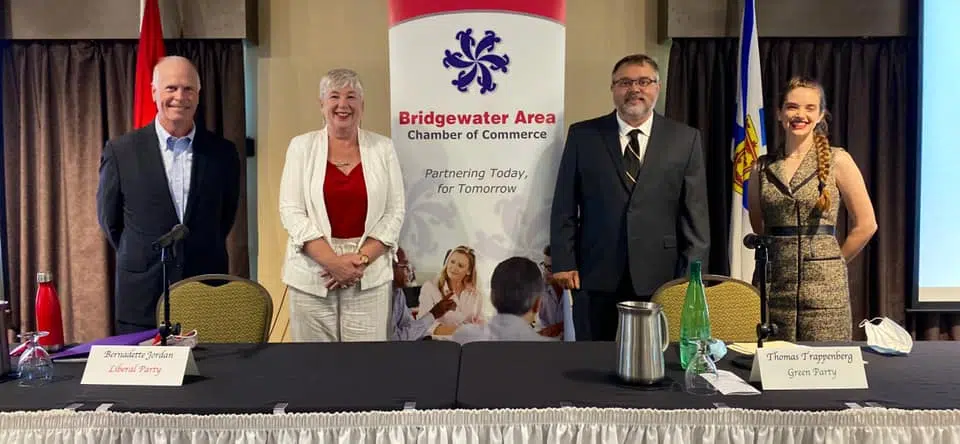
The four candidates running in the riding of South Shore-St.Margarets; Rick Perkins (far-left), Bernadette Jordan (left), Thomas Trappenburg (right) and Olivia Dorey (far-right). Photo: Bridgewater and Area Chamber of Commerce.
Four of the candidates running for office in South Shore-St.Margarets squared off Tuesday night in what was a mostly friendly debate.
The event was hosted by the Bridgewater and Area Chamber of Commerce who invited all four candidates in the riding to the debate.
The field consisted of incumbent Liberal candidate Bernadette Jordan, Conservative Rick Perkins, NDP Oliva Dorey, and Green candidate Thomas Trappenburg.
The candidates were all given the questions ahead of the debate so they had time to prepare their answers. That led to answers being closely linked to each parties platforms and their plans to solve various issues being faced across the country.
The first question candidates were asked about was on their positions on the housing crisis and if they supported creating a national housing commission to help tackle the issue.
All of the candidates were open to the creation of a commission but their answers showed their different approaches to housing. Both Bernadette Jordan of the Liberals and Olivia Dorey of the NDP agree the government needs to protect those seeking housing specifically the most vulnerable. Dorey was supportive of rent control as a permanent measure but Jordan wasn’t on board for permanent measures.
In Dorey’s answer she painted a vivid picture of the situation, “Working people are struggling to keep a roof over their head, I am watching myself and my friend’s prospect of owning a home drift away and we need action right now as many people are unsure of where they will be sleeping this winter,”.
Jordan pointed to already announced investments in housing as indicators that her party is committed to improving the situation, specificly pointing to the creation of 25 new rental units in Bridgewater as an example.
Conservative Rick Perkins said the key to improving housing supply is the key to solving the housing crisis. He says his party would remove red tape that prohibits developers from undertaking affordable housing projects in Nova Scotia.
Trappenburg with the Greens also acknowledged the need for housing solutions and says his party supports the creation of a housing commission along with investing in the building of more homes and affordable rental units.
The first question and opening statements gave a good indicator of what was to follow in the debate, candidates avoiding conflict with one another and rather focusing on their own parties’ plans and strategies. Overall the event was very civil with very few, if any contentious moments between the candidates.
The second question focused on what each candidate’s party planned to do in support of Nova Scotia’s healthcare system.
Perkins suggested that the government has dropped the ball in recent history in supporting the province’s health care systems, “The federal government used to pay for around 50 per cent of health care costs, that’s dropped to around 22 per cent recently and that just isn’t good enough,”. He went on to say that an O’Toole government would double payments made to the provinces for healthcare and they would make them “string-free” so each province can spend the money on healthcare solutions they prioritize.
Jordan touted plans to improve medical staff recruitment as one of the key ways her party intends to help. “We are committed to investing $3.2 billion to support provinces in recruiting health care professionals and we will establish a student loan forgiveness program for medical professionals that work in rural communities,”.
Dorey also echoed sentiments about increasing investment in health care with a specific focus on mental health care support.
Trappenburg was also in agreement about the need for more investment but also says more needs to be done to educate Canadians on healthy living so fewer people end up needing acute medical care.
All three candidates were in agreement that the issues of housing and healthcare were the most pressing issues for people in South Shore- St Margarets and following the first two questions the debate switched over to more specific questions about things like the environment, fishing, and indigenous reconciliation.
You can still watch the debate to see the full event and answers to those specific questions.








